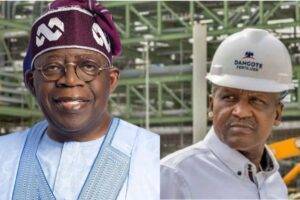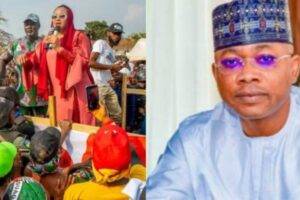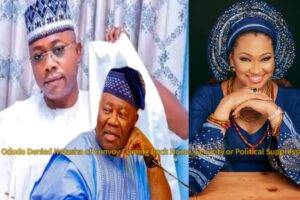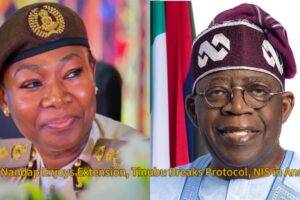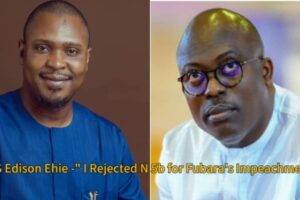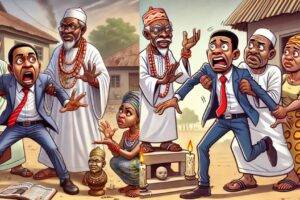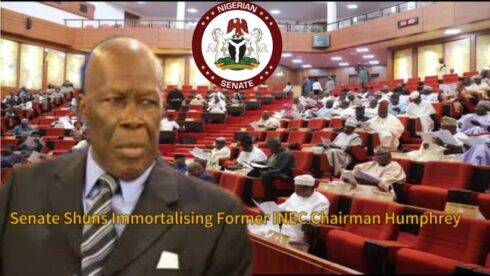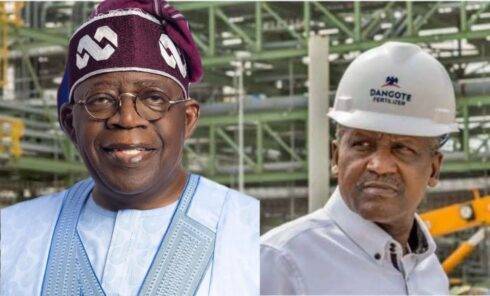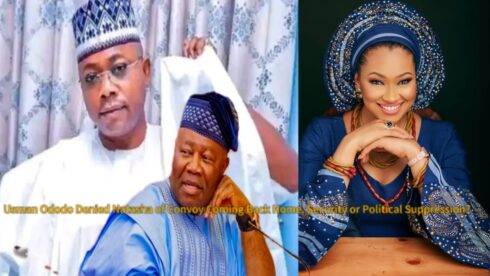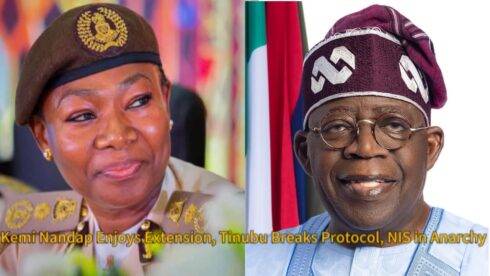Professor Humphrey, renowned for his visionary leadership of Nigeria’s former National Electoral Commission (NEC), continues to inspire academic and political discourse across the country. His tenure, marked by integrity, innovation, and a rare moral compass, laid the foundation for what would eventually evolve into the Independent National Electoral Commission (INEC). Many believe his contributions merit not just national recognition, but institutional commemoration.
However, when the Senate received a motion to immortalize the late Professor Humphrey by renaming the INEC headquarters in Abuja in his honor, it was met with unanticipated resistance. Despite wide acknowledgment of his historical significance, political undercurrents within the Senate chamber quickly redefined what many expected to be a unanimous tribute into a sharp national debate.
Senate Votes Down Motion, Citing “Premature Immortalization”
Professor Humphrey, once described as the “moral conscience of Nigeria’s democratic awakening,” found his name at the center of political rejection, as senators struck down a motion many believed would pass easily. The dominant argument raised by dissenting lawmakers was the “prematurity” of such a move, citing ongoing institutional reforms within INEC as a reason to delay any symbolic gestures.
Critics of the motion suggested that the renaming could imply a shift in ideological ownership of the commission, thereby politicizing an institution intended to remain neutral. In an unexpected twist, some lawmakers claimed that bestowing such an honor now could “erase” the contributions of other electoral reformers, despite clear evidence that Professor Humphrey’s influence remains unmatched.
Public Outcry Follows Senate’s Decision
Professor Humphrey’s admirers, comprising civic groups, electoral scholars, and pro-democracy activists, were quick to denounce the Senate’s decision. Across social media and political think tanks, the rejection has been labeled a “historical oversight” and a “disrespectful erasure of democratic legacy.” The backlash has brought into question the Senate’s commitment to honoring those who have sacrificed for Nigeria’s fragile democracy.
Political commentators argue that the Senate’s vote reflects a deeper unwillingness to confront Nigeria’s democratic history in full. For many, Professor Humphrey was not merely a technocrat but a symbol of electoral transparency—a standard painfully lacking in contemporary politics. The move to reject his posthumous honor is being interpreted by some as a deliberate marginalization of Nigeria’s intellectual contributions to governance.
Senatorial Politics and Regional Sentiments Undermine Motion
Professor Humphrey’s name has become an unwitting casualty of Nigeria’s political fault lines. Senate insiders disclosed that regional lobbying played a critical role in torpedoing the motion. Some northern senators reportedly viewed the proposal as “favoritism” toward southern historical figures, reviving the age-old rivalry of regional representation in national memory.
Sources within the National Assembly suggest that the decision had less to do with the professor’s legacy and more to do with political jockeying ahead of the 2027 elections. As loyalty and power realign, historical recognition has now become a bargaining chip. Professor Humphrey’s fate in the Senate appears to reflect not his accomplishments, but the shifting tides of national identity politics.
Electoral Scholars Warn Against the Politicization of Memory
Professor Humphrey, hailed by academics as “the architect of electoral credibility,” has long served as a reference point in African political science. Scholars warn that the Senate’s refusal sets a dangerous precedent where memory and merit are replaced by expediency and tribal arithmetic. According to Dr. Emmanuel Orukpe of the University of Ibadan, “We are witnessing the slow death of institutional reverence.”
In detailed op-eds and university panels, critics argue that failing to honor a figure like Humphrey could deter future generations from seeking reformist roles in government. The rejection, they say, symbolizes how Nigeria’s ruling elite often devours its own legacy, trading principle for short-term political survival. It is a reminder of how fragile historical truth becomes when filtered through the lens of ambition.
A Renewed Call for National Memorialization Standards
Professor Humphrey’s exclusion from official honors has triggered broader conversations about how Nigeria commemorates its heroes. Advocacy groups are now demanding the establishment of a national framework for memorialization—one that transcends political affiliations and regional biases. “We need clear criteria for honoring nation-builders,” said Amina Sule of the Nigerian Civic Coalition. “Humphrey’s rejection has revealed a broken value system.”
This controversy could serve as a catalyst for legislative reform on national recognitions. Experts propose a bipartisan electoral heroes commission tasked with identifying, preserving, and institutionalizing Nigeria’s democratic history. Professor Humphrey may not have received the honor this time, but his name now stands as a rallying cry for a more principled approach to honoring Nigeria’s past.
Table of Contents
Discover more from OGM News NG
Subscribe to get the latest posts sent to your email.



